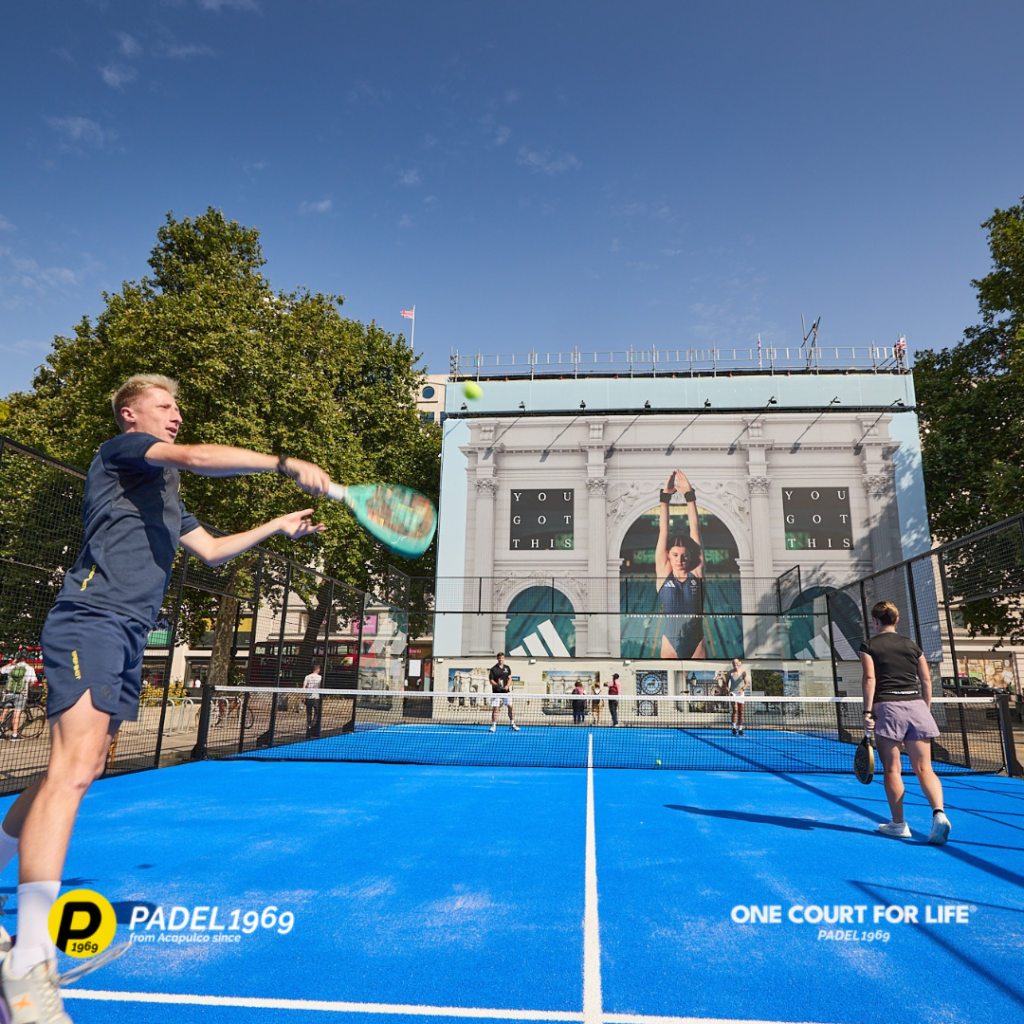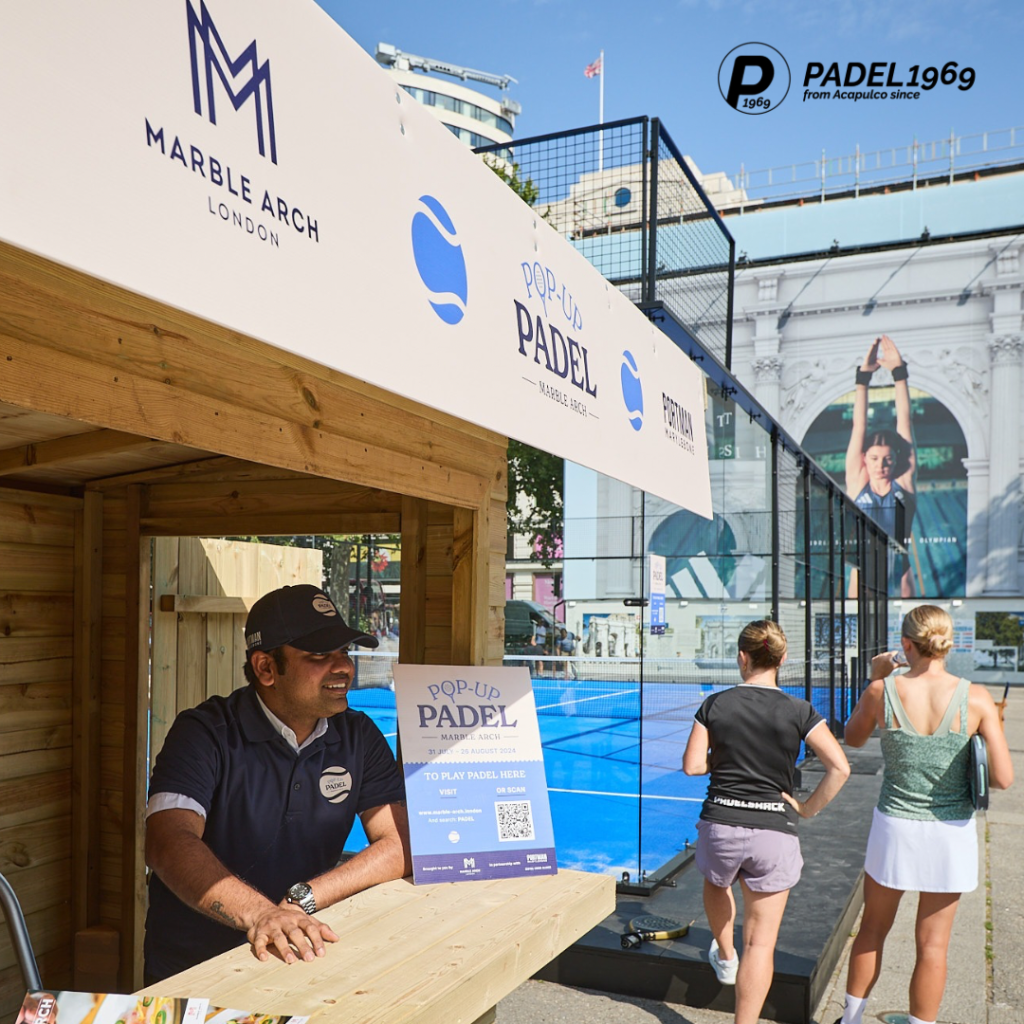The Marble Revolution: How a Spanish Sport is Reshaping London’s Cultural Landscape
Under the shadow of London’s iconic Marble Arch, a curious event is taking place. Where once stood a symbol of British imperial might, now emerges a harbinger of cultural fusion and urban vitality. PADEL1969, with its audacious placement of a Padel court at this historic site, is not merely introducing a sport—it’s igniting a revolution in how we perceive public spaces and communal wellbeing.
London’s Marble Arch
Marble Arch is a grand limestone monument designed to glorify British victories. It stood as a formal gateway to Buckingham Palace for many years, until it was transferred to stand as a portal to Hyde Park; however, a new road scheme cut through the park leaving them completely separated, thus isolating the grandiose Arch.
Under the authority of the Westminster City Council, London’s Marble Arch, now bears witness to different kinds of triumph. This August, the rhythmic thwack of Padel balls against plexiglass walls echoes through the air, a sound as foreign to this corner of London as the sport itself. Yet, in this juxtaposition lies a powerful metaphor for modern Britain—a nation built on tradition but propelled forward by innovation and diversity.
Why has Padel Come to the West End?
Padel, a sport born in Mexico and popularized in Spain, finds itself an unlikely bedfellow to the architecture of Nash. But perhaps this is exactly what makes its presence so compelling. In an era where Brexit has raised questions about Britain’s place in the world, PADEL1969‘s court stands as a statement of openness and interconnectedness.
The genius of this initiative lies not just in its boldness, but in its accessibility. Positioned at the nexus of tube stations and bus routes, the court beckons to passersby, inviting them to pause their hurried London lives and engage in play. It’s an exciting vision of sport, one that doesn’t sequester itself in exclusive clubs but rather inserts itself into the very fabric of urban life. One warmly welcomed by the West End Londoners, as Nicolas Larrosa, GHS Padel, reported, 50% of the court bookings were full before the opening this past Wednesday, July 31st.
But this is more than just about sport—it’s about reimagining the function of public spaces in our cities. The West End, long known for its theatres and shopping, now offers a new form of entertainment, one that promotes physical health and social interaction. In a city grappling with issues of loneliness and sedentary lifestyles, the PADEL1969 Padel court emerges as a breath of fresh air, an unexpected remedy.
The Cultural Landscape in London’s West End
Critics might argue that putting a Padel court is an affront to British heritage, a commercialization of hallowed ground. Yet, The West End has always been known for its forward and vibrant culture. Isn’t this precisely what keeps a culture alive—the ability to evolve, to incorporate new elements with respect to the old?
The Arch remains, its grandeur undiminished, but now it presides over a space that pulses with life and energy, instead of isolation and sedentariness.
Rohan McWilliam explains in his “London’s West End: Creating the Pleasure District“, that the West End has been THE place for cultural and intellectual capital. In his book, he discusses the art within the city and how it could be capitalized and might turn the West End on its head, propelling it to heights it has yet to know. It is then fair to surmise that the collaboration between art and sport could then be the catalyst for this corner of the city.

Padel’s Impact on Public Wellbeing
PADEL1969‘s ONE COURT FOR LIFE® — speaks to a deeper truth. In our fragmented, digital age, there’s a hunger for real-world connections, for spaces that foster community and shared experiences. This single court, incongruously placed yet perfectly positioned, has the potential to become a catalyst for the city, a new way of life.
Promoting healthy activities such as Padel in the West End could serve as a preventive health measure. Providing an accessible, enjoyable form of exercise, such as Padel, a sport that combines physical exercise, social interaction, and stress relief, makes it an excellent tool for improving both physical and mental health.
Of course, it should be noted that a healthier, more active community in the heart of London will not be built on the back of one sport alone. While Padel can be a valuable tool for improving public health, it should be part of a broader approach to wellness that includes a balanced diet and other forms of physical activity.
The West End Welcomes PADEL1969
As the sun sets on Marble Arch, this August, casting long shadows across the Padel court, one can’t help but feel a sense of optimism. Here, in the heart of London, a new narrative is being written—one of cultural exchange, of physical wellbeing, of community resilience. It’s a narrative that acknowledges the past while boldly embracing the future.
In the end, perhaps this is what the Marble Arch has always been about—not just a celebration of past glories, but a gateway to new possibilities. And as Londoners and tourists alike pick up Padel rackets, engaging in this novel sport under the watchful gaze of a 19th-century monument, they’re not just playing a game. They’re participating in the ongoing, ever-evolving story of a great cosmopolitan city.
Need advice about managing a club or installing a Padel court? Click Here to learn more.
Book a call with us if you want to build a Padel court and don’t know where to start or contact us at [email protected] for more on our advisory services.
padel1969.com
PADEL1969 | from Acapulco since 1969

